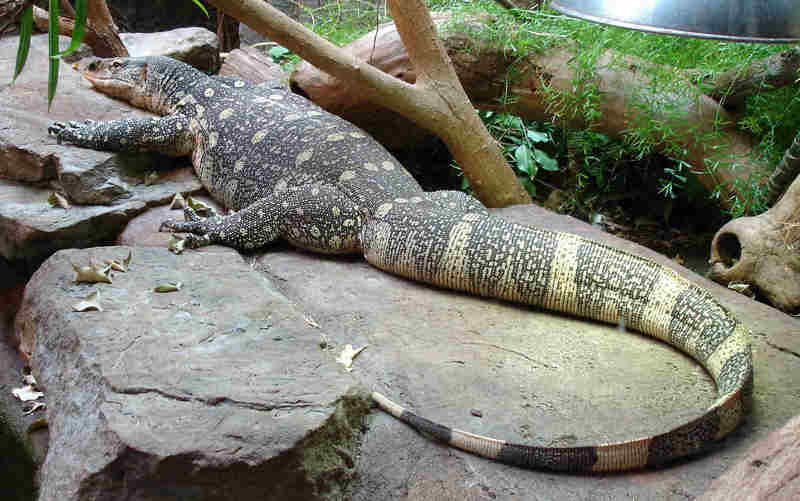|
| Query: Viper fish | Result: 15th of 15 | |
Nile Monitor (Varanus niloticus) - Wiki
| Subject: | Nile Monitor (Varanus niloticus) - Wiki
| |

| Resolution: 2007x1258
File Size: 227340 Bytes
Date: 2005:04:30 11:40:31
Camera: DSC-P100 (SONY)
F number: f/2.8
Exposure: 10/400 sec
Focal Length: 79/10
Upload Date: 2007:09:20 19:13:04
|
Nile monitor
From Wikipedia, the free encyclopedia
[Photo] A Nile Monitor at London Zoo. Photographed by User:Bluemoose (http://en.wikipedia.org/wiki/User:Bluemoose) in May 2005. | Permission is granted to copy, distribute and/or modify this document under the terms of the GNU Free Documentation License, Version 1.2 or any later version published by the Free Software Foundation; with no Invariant Sections, no Front-Cover Texts, and no Back-Cover Texts. A copy of the license is included in the section entitled "GNU Free Documentation License". |
The Nile monitor (Varanus niloticus) is a large member of the monitor lizard family (Varanidae).
Nile monitors grow to about 6 to 7 feet in length. They have muscular bodies, strong legs and powerful jaws full of sharp teeth. They also possess sharp claws used for climbing, digging, defense, or tearing at their prey. Like all monitors they have a forked tongue, which facilitates their sense of smell.
Nile monitors live in Africa and are found near their namesake, the Nile and all the way to southern Africa; they have also been introduced to Florida. Their nostrils are placed high on the snout, indicating that these animals are highly aquatic, but are also excellent climbers and quick runners on land. Nile monitors feed on fish, frogs, eggs, birds, small mammals, large insects, and carrion.
In Southern Africa they are commonly referred to as "leguaan", from the Dutch for iguana.
As pets
Nile monitors require experienced care as pets and are not recommended for beginners, nevertheless they are often found in the pet trade.
Nile monitors need a very large cage for when they are full grown their about 7ft. Due to their large size, adults are likely to require custom built quarters. Soil, sand, or bark chippings can be used as substrate. The enclosure should contain things to make a suitable habitat such as rocks, driftwood, plastic plants or hollow logs. A water dish large enough for the lizard to soak in should be used. Nile monitors have a tendency to defecate in the water dish so clean it whenever soiled or at least daily.
Nile monitors should have a daytime temperature gradient of about 80-90° F (27-32° C) and a night time temperature of about 78-80° F (26-27° C). A basking spot of 140 F should be provided at least 12 hours a day. A thermometer can be used to verify the temperature. The humidity should be moderate.
This species is very hardy in captivity when properly maintained. Wild caught animals should be checked for internal parasites. The Nile monitor has a very aggressive temperament with a powerful bite and a lashing tail and therefore is very dangerous. If raised with regular handling and a positive view of its keeper, a Nile monitor can to some extent be tamed."There are few lizards less suited to life in captivity than the Nile monitor. Buffrenil (1992) considered that, when fighting for its life, a Nile monitor was a more dangerous adversary than a crocodile of a similar size. Their care presents particular problems on account of the lizards' enormous size and lively dispositions. Very few of the people who buy brightly-coloured baby Nile monitors can be aware that, within a couple of years, their purchase will have turned into an enormous, ferocious carnivore, quite capable of breaking the family cat's neck with a single snap and swallowing it whole."
(Bennett, D. 1995. Little Book of Monitor Lizards, Viper Press, Aberdeen, UK)
In June 2007, they were sighted in and near Sanibel,Florida.
In popular culture
Zoo Tycoon 2: African Adventure included the Nile monitor as one of their 20 animals.
http://en.wikipedia.org/wiki/Nile_monitor
| The text in this page is based on the copyrighted Wikipedia article shown in above URL. It is used under the GNU Free Documentation License. You may redistribute it, verbatim or modified, providing that you comply with the terms of the GFDL. |
|
Comments |
|---|
| | Guest |
|
Scientific Name: Varanus niloticus (Linnaeus in Hasselquist, 1762)
Common Names: Nile Monitor |
^o^
Animal Pictures Archive for smart phones
^o^
|
|
|

